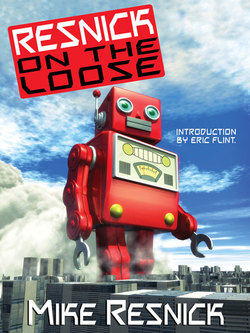Читать книгу Resnick on the Loose - Mike Resnick - Страница 20
На сайте Литреса книга снята с продажи.
ОглавлениеLooking Close to Home
Science fiction tends to take place a long distance away from here, both in time and in space. But it has always been able to take today’s problems and explore them in exotic settings that help remove them from the emotional bitterness and even hatred that they engender among those who find themselves on the other side of the issue.
And today, as always, there are some major problems that science fiction should be (and is) tackling in less personal settings.
For example, as I write these words, it is late May of 2009, and while both sides of this particular issue have been arguing it for a couple of years, President Obama and former Vice President Cheney have just drawn clear distinctions between the two positions, and each has argued his case passionately. And the question the American people are being asked to decide is: at what point, if any, are harsh interrogation methods justified? At what point do they become torture? And is torture itself ever justified?
I would guess that every civilized person’s first response is to say that no, of course torture is never justified—so why are we having the debate?
Okay. We now have been told by Mr. Cheney that waterboarding revealed the existence of a planned attack on a bank tower in Los Angeles, a plan that was thwarted only because the victim of the waterboarding, who had refused to cooperate with his interrogators for weeks prior to that, gave them all the vital details they needed during his unpleasant experience.
Unjustified?
According to the polls, the American people are split on it. After all, there were a lot of planned attacks. This one might not have come off.
Now let’s pretend that my wife works in that building, and would be instantly killed if and when a plane rammed into it.
Still unjustified? Not to me, not when I have that kind of personal stake in it.
So we come to the crux of it: is torture acceptable under rigidly-defined extreme circumstances, like saving the 5,000 Angelinos who might be in that tower at Zero Hour? Or—everyone’s favorite example—if it is the only way to find out where a bomb (possibly a nuke) has been hidden before it explodes?
But there’s another consideration, too. Everyone will grant that waterboarding and similar methods are harsh methods of interrogation indeed. But are they torture?
After all, the terrorist who revealed the information about the tower was perfectly healthy the next day. He suffered no ill effects, and waterboarding him may have saved a few thousand lives. (Of course, it may not have saved them; as President Obama points out, we’ll never know what continued gentler methods might have achieved.) But the fact remains that, unlike the torture our soldiers suffered at the hands of the Japanese in World War II, this man emerged none the worse for wear. Indeed, our navy Seals undergo waterboarding routinely to prepare them for it should they fall into enemy hands; no one has ever died or been permanently disabled by it.
Still, many—including our President—feel that it is opposed to the principles embedded in the Constitution. There is an argument, perhaps valid, that using such methods makes us no better than our enemies. And there is another argument that until you know there is a hidden bomb set to explode in three hours, you apply all legitimate methods of questioning on the assumption that sooner or later you’ll get the answers you need.
I realize there are two sides to the question, and each side is sure it has the morally correct position. Which makes it perfect fodder for science fiction.
You want another one, plucked from today’s headlines?
Is a preventive war ever justified? Must a moral, ethical nation (like, hopefully, us) wait to be attacked before going to war?
Now, when polled, most people today say the war in Iraq was not justified, because clearly our intelligence was wrong about the weapons of mass destruction. But that’s not the example science fiction should pay attention to; it has been proven that no nukes existed in Iraq. Case closed.
But as I write this, the North Koreans tested a nuke in a major underground explosion 36 hours ago, and every watching and listening post says that what they tested was more powerful than the bomb that was dropped at Hiroshima. And between that test and this minute, they’ve tested a missile that could deliver nuclear warheads.
And they don’t like us very much.
So this is where science fiction can examine the question from both sides: stories in which we do attack an enemy with devastating weapons that has threatened us, and stories where we don’t, where we apply diplomacy, economic pressure, or simply hope for the best.
Another?
Look at our southern border. Extrapolate that any way you want: we become an isolated island nation, with walls the length of the Mexican and Canadian border; we become a Spanish-speaking nation that is 85% Hispanic by 2060 A.D.; or we find a happy compromise—and if so, what is it?
Scientific American and its sisters are valid sources for material…but everywhere you look there’s material for stories, set in the almost-here-and-now or examining the same problems in the far future, with aliens and robots and what-have-you substituting for waterboarding and North Korea and Hispanics. And this is one editor who thinks these very human problems are more important than how your spaceship can avoid meteors at light speeds.
Politicians can predict the future, usually with great flourish and very little intelligence, but only science fiction can show it to you, can lay it out and examine all the consequences.
That’s why we remain the most important form of fiction in the entire realm of literature.
